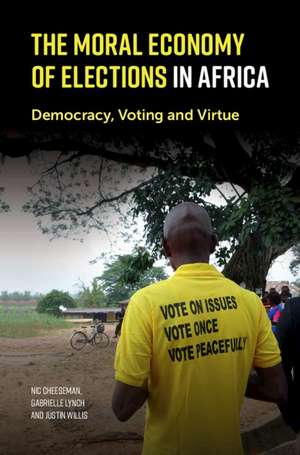The Moral Economy of Elections in Africa: Democracy, Voting and Virtue
Autor Nic Cheeseman, Gabrielle Lynch, Justin Willisen Limba Engleză Paperback – 17 feb 2021
| Toate formatele și edițiile | Preț | Express |
|---|---|---|
| Paperback (1) | 289.95 lei 43-57 zile | |
| Cambridge University Press – 17 feb 2021 | 289.95 lei 43-57 zile | |
| Hardback (1) | 703.24 lei 43-57 zile | |
| Cambridge University Press – 17 feb 2021 | 703.24 lei 43-57 zile |
Preț: 289.95 lei
Nou
Puncte Express: 435
Preț estimativ în valută:
55.48€ • 58.08$ • 45.91£
55.48€ • 58.08$ • 45.91£
Carte tipărită la comandă
Livrare economică 07-21 aprilie
Preluare comenzi: 021 569.72.76
Specificații
ISBN-13: 9781108404723
ISBN-10: 1108404723
Pagini: 288
Dimensiuni: 152 x 228 x 22 mm
Greutate: 0.5 kg
Editura: Cambridge University Press
Colecția Cambridge University Press
Locul publicării:Cambridge, United Kingdom
ISBN-10: 1108404723
Pagini: 288
Dimensiuni: 152 x 228 x 22 mm
Greutate: 0.5 kg
Editura: Cambridge University Press
Colecția Cambridge University Press
Locul publicării:Cambridge, United Kingdom
Cuprins
Introduction. Writing African elections; 1. Towards a moral economy of elections in Africa; 2. Elections, states and citizens: a history of the ballot in Ghana, Kenya and Uganda; Part I. Promoting Civic Virtue: National Exercises: 3. Making states and citizens through the ballot; 4. The eyes of the world are upon us: the aspirations and limitations of international election observation; 5. Creating democrats: Civil society and voter education; Part II. The Moral Economy in Action: 6. Performing virtue: politicians, leadership and election campaigns; 7. Navigating multiple moralities: popular expectations and experiences of the polls; 9. Conclusion: the electoral fallacy revisited.
Recenzii
'A fresh and nuanced exploration of elections in Africa through the lens of moral virtue. How do political actors – citizens, politicians, officials – endeavor to 'do the right thing' (as they see it) about voting, seeking office and managing the polls? Using multiple research methods, the authors uncover a range of complex popular conceptions of good leadership and proper elections. They find that, in resolving tensions between civic virtue and patrimonial obligation, many Africans are constructing forms of political accountability that are culturally authentic.' Michael Bratton, Michigan State University
'Cheeseman, Lynch and Willis critically examine the behavior of key actors in Africa's electoral processes. Drawing on the tension between civil and patrimonial registers, this book offers new and provocative insights into the dynamics of African elections. Highly relevant for students and scholars of African politics and beyond.' Sebastian Elischer, University of Florida
'A timely and important book on ideas of virtue and the moral economy of elections in Africa. It is comprehensive in its comparison of Ghana, Kenya, and Uganda and is an essential read for scholars of politics.' Peace A. Medie, University of Bristol
'Why do people invest time, money and energy in elections that are not free and fair? This provocative book draws on careful research in Kenya, Uganda and Ghana to persuasively argue that a politics of virtue is at play, in which both voters and politicians use elections to stake out moral claims. The book, which challenges conventional understandings of elections, such as those that focus on patrimonial and ethnic politics, is certain to gain recognition as one of the most important theoretical works on African politics.' Aili Mari Tripp, University of Wisconsin, Madison
'Highly recommended. Upper-division undergraduates. Graduate students and faculty.' C. E. Welch, Choice
'Cheeseman, Lynch and Willis critically examine the behavior of key actors in Africa's electoral processes. Drawing on the tension between civil and patrimonial registers, this book offers new and provocative insights into the dynamics of African elections. Highly relevant for students and scholars of African politics and beyond.' Sebastian Elischer, University of Florida
'A timely and important book on ideas of virtue and the moral economy of elections in Africa. It is comprehensive in its comparison of Ghana, Kenya, and Uganda and is an essential read for scholars of politics.' Peace A. Medie, University of Bristol
'Why do people invest time, money and energy in elections that are not free and fair? This provocative book draws on careful research in Kenya, Uganda and Ghana to persuasively argue that a politics of virtue is at play, in which both voters and politicians use elections to stake out moral claims. The book, which challenges conventional understandings of elections, such as those that focus on patrimonial and ethnic politics, is certain to gain recognition as one of the most important theoretical works on African politics.' Aili Mari Tripp, University of Wisconsin, Madison
'Highly recommended. Upper-division undergraduates. Graduate students and faculty.' C. E. Welch, Choice
Notă biografică
Descriere
A radical new approach to understanding Africa's elections: explaining why politicians, bureaucrats and voters so frequently break electoral rules.
